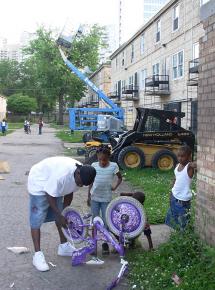A tragedy that shouldn’t have happened
explains how some of Chicago's most powerful figures are connected to the death of a 3-year-old boy at a public housing complex.
CURTIS COOPER, a three-year-old boy who lived in the Cabrini Green row houses in Chicago, was killed on June 27--crushed by a 7-foot steel gate that fell on him while he was riding his tricycle, as his mother watched in horror. On the ground where Curtis used to play lies a makeshift memorial of stuffed animals.
Two days after the tragedy, inspectors found that the gate violated city codes. "Two of the three hinges that kept this heavy gate in place were rusted through," an attorney for Curtis' mother told reporters.
The company that manages the Cabrini Green row houses is Urban Property Advisers (UPA). Last year, UPA was fined for building code violations at New Evergreen/Sedgwick Apartments, due to raw sewage that rose up to the electrical outlets.
Shirley Halvert, a resident of Cabrini Green since 1979, said there are "accidents waiting to happen all over the [complex]." Halvert pointed to a large crane that occupies the area behind the buildings at Chestnut and Cambridge, where small children play--they have no other choice, since this is their backyard. Some of the buildings have loose electrical wires, tangled and dangling; burn marks; and chunks of concrete crumbling off the walls.

Why wouldn't the Chicago Housing Authority (CHA) and Mayor Richard Daley choose a management company that keeps properties safe and well maintained? Under the CHA lease agreement, "The CHA is obligated...to maintain the dwelling unit[s] and development in a decent, safe and sanitary condition."
But residents like Doyal Dorman, who has lived in Cabrini since 1951, recognize that city officials and their real estate developer friends are trying to clear out the complex.
"This is land grabbing," Dorman said. "This is very rich land here. If they fixed things up, the people would want to stay...but they've been trying to get rid of us... The lowest priced new home they built around here is $489,000. That shows you who they want over here now."
UPA IS owned and run by Cullen Davis, whose father is a close ally of Daley and appointee to the prestigious Chicago Plan Commission. When UPA was formed about seven years ago, it and other companies connected to the Davis family donated money to the 17th Ward, political home of Terry Peterson, then the chief executive of the CHA.
UPA went on to win CHA contracts to manage five properties. Each of these five properties is in the process of being developed into a mix of market-rate condos and public/affordable housing, the hallmark of Daley's "Plan for Transformation," officially launched in 2000.
In reality, the Plan for Transformation is a strategy for clearing large public housing complexes so real estate developers can move in. For this to happen, public housing tenants have to be pushed out.
As Dorman pointed out, the price tag on the market-rate condominiums are in the mid-to-high six figures, so the Davises stand to make a great deal of money if the Plan for Transformation goes through.
Meanwhile, only 30 percent of the promised public units have been completed so far--overall, according to housing advocates, there will be a loss of about 13,000 units. Part of the contract for UPA's bank loan stipulates that it must pre-sell half of the market-rate condos in a building before it can work on public units.
Since the half-million-dollar condos aren't moving quickly because of the mortgage crisis, the public housing isn't being built. Meanwhile, thousands of families end up in limbo--driven into substandard and temporary housing, shelters, overcrowded shared apartments and homelessness.
After Curtis' death, the CHA announced the suspension of UPA's contract for the Cabrini property. But UPA's Web site still lists the row houses as their property, and the firm's four other contracts with the CHA remain. According to the UPA's Web site, these properties are also slated for "massive rehabilitation." In reality, "massive rehabilitation" looks like massive evictions and dangerous mismanagement of buildings that thousands of Chicagoans call home.
Curtis Cooper's family is suing UPA, charging that Curtis died due to the developers' neglect of their legal responsibility to keep public housing safe. As Deirdre Brewster, displaced from Cabrini Green and a member of the Coalition to Protect Public Housing, asked, "If UPA was managing a place like [high-rent] Presidential Towers, and a tragedy of this magnitude happened, would there even be a question that UPA would be removed?"


